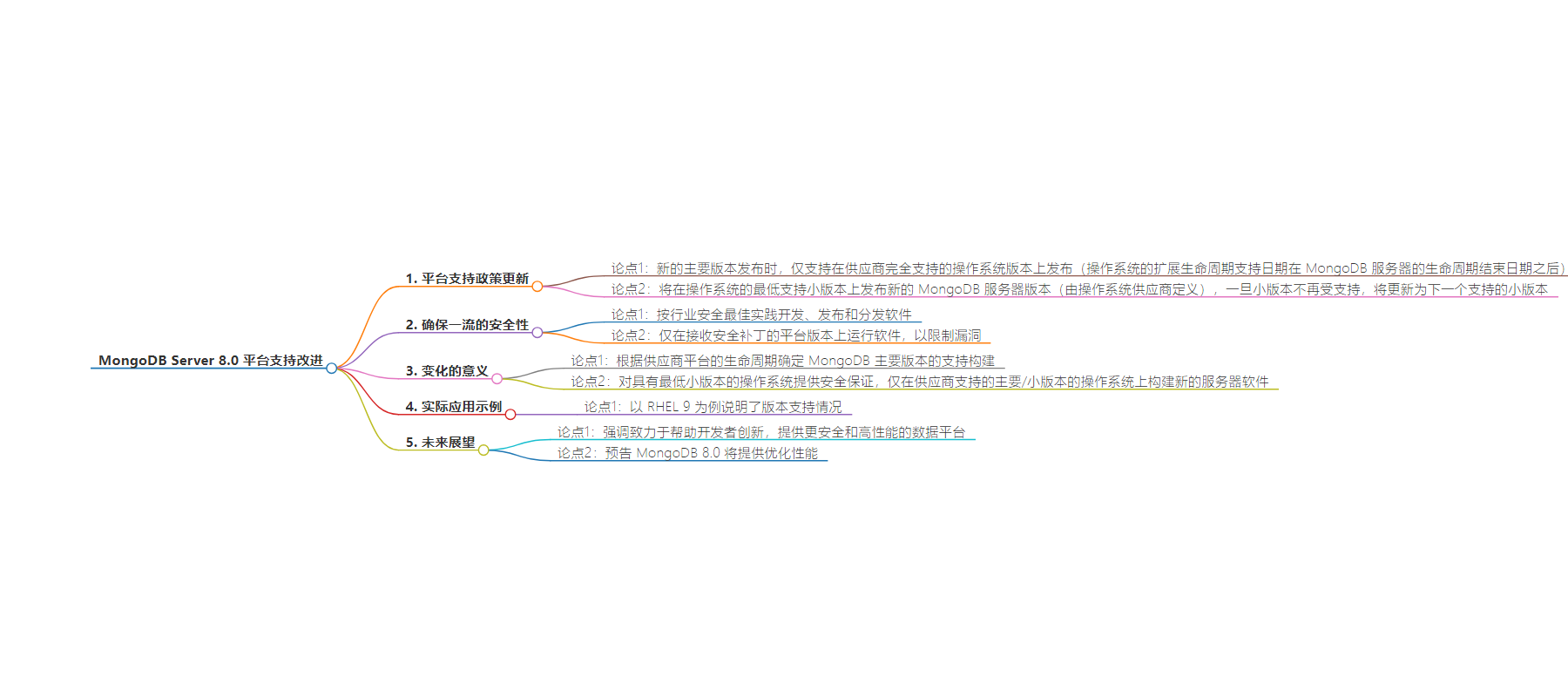包阅导读总结
1. 关键词:MongoDB 8.0、Server Platform Policy、Operating Systems、Security、Performance
2. 总结:本文主要介绍了 MongoDB 8.0 平台支持的改进,包括服务器平台政策的更新,强调根据操作系统支持期限和版本进行部署,以确保安全性和性能,同时提及根据新政策的工作示例及对未来的展望。
3. 主要内容:
– MongoDB 8.0 是 MongoDB 现代数据库的新进化,注重性能、可扩展性和运营弹性
– 服务器平台政策更新
– 新的 MongoDB 主要版本仅在操作系统完全支持期间发布
– 按操作系统最低支持小版本发布新服务器版本
– 保留因用户需求和技术困难停止支持平台的权利
– 确保一流的安全性
– 按行业安全最佳实践开发、发布和分发
– 限制运行 EOL 操作系统带来的漏洞
– 变化的意义
– 根据操作系统生命周期确定支持的版本
– 保证操作系统最低小版本的安全保证
– 示例:以 RHEL 9 为例说明新政策的工作方式
– 未来展望:强调对开发者的帮助,期待 MongoDB 8.0 提供更优性能
思维导图:
文章地址:https://www.mongodb.com/blog/post/announcing-mongodb-server-8-0-platform-support-improvements
文章来源:mongodb.com
作者:Alexandre Ettouati
发布时间:2024/6/17 13:07
语言:英文
总字数:801字
预计阅读时间:4分钟
评分:86分
标签:MongoDB,数据库,平台支持,安全性,性能
以下为原文内容
本内容来源于用户推荐转载,旨在分享知识与观点,如有侵权请联系删除 联系邮箱 media@ilingban.com
Last month at MongoDB.local NYC 2024, we announced the preview of MDB 8.0, the next evolution of MongoDB’s modern database. With MongoDB 8.0, we’re focused on delivering the unparalleled performance, scalability, and operational resilience necessary to support the creation of next-generation applications.
For that to be possible, users must be able to deploy MongoDB on industry-standard operating systems. As a result, we are updating our Server Platform Policy to ensure that customers have the best possible experience when using MongoDB.
Starting in MongoDB 8.0, there will be two new changes:
-
When a new major version of MongoDB is released, we will only release it operating system (OS) versions that are fully supported by the vendor for the duration of the MongoDB version’s life. In short, we will support an operating system if the operating system’s Extended Lifecycle Support (ELS) date is after the MongoDB Server’s End of Life (EOL) date.
-
We will release new MongoDB Server versions (both major and minor) on the minimum supported minor version of the OS (defined by the OS vendor). Once an OS minor version is no longer supported by the vendor, we will update future MongoDB Server versions to the next supported OS minor version.
As always, MongoDB reserves the right to discontinue support for platforms based on lack of user demand and/or technical difficulties (e.g., if a platform doesn’t support required libraries or compiler features).
Ensuring best-in-class security
MongoDB routinely updates our documentation to indicate which platforms a new version of the MongoDB Server will be available on with the general availability release of that new server version.
To ensure that MongoDB customers can meet strong regulatory and security requirements, our software is developed, released, and distributed in accordance with industry security best practices. Given the mission-critical nature of MongoDB’s business—providing a highly secure, performant data platform to tens of thousands of customers in over 100 countries—we strive to provide strong and consistent security assurances across all of our products. In addition, MongoDB partners also need guarantees about the security development lifecycle of our products so they can provide the best experience to their customers.
By ensuring that our software runs only on platform versions that are receiving security patches, we aim to limit the vulnerabilities that might be introduced by customers running EOL operating systems.
The significance of this change
With every major server release, MongoDB determines the supported builds for that general availability (GA) release according to the planned vendor platform’s end of life date —meaning the MongoDB major release will not support the operating system if the operating system’s extended lifecycle support ends before the MongoDB EOL date. This also applies to server container images delivered to our customers.
Furthermore, to guarantee security assurances for operating systems that have a minimum minor version, we will only build new versions of MongoDB Server software on a vendor-supported major/minor version of the operating system. Concretely, we will build new versions of MongoDB on a minimum minor version until it hits a maintenance event (defined on a per-vendor basis), and at that point future MongoDB server builds will be updated to the new supported minor version.
Separately, when a vendor publishes a new major version of an operating system after a given version of MongoDB reaches GA, we will evaluate whether the latest MongoDB release will run on this new OS version, or we will wait for the next major MongoDB release before documenting formal platform support on our website.
Walkthrough: How it could work for you
Consider the RHEL 9 Planning Guide below and the hypothetical release cadence of MongoDB version X.0. As long as version X.0 is released three years before the end of RHEL 9 support, which as noted by RHEL is 2032, we will provide support on RHEL 9. This means that 2029 will be the last year that MongoDB releases a server version on RHEL 9.
Next, consider that version X.0 will be released at the end of 2025. Following the Extended Update Support Plan, we will build version X.0 on RHEL 9.6 until the start of 2026 when RHEL 9.8 becomes available. And then for future versions, MDB X.Y will begin being built on RHEL 9.8 until we require the minimum version to be 9.10 in 2027.
Building the future
Overall, these coming changes to the MongoDB Server Platform Policy underscore MongoDB’s commitment to helping developers innovate quickly and easily while providing an even more highly secure and performant data platform.
Stay tuned for additional updates about MongoDB 8.0—which will provide optimal performance by dramatically increasing query performance, improving resilience during periods of heavy load, making scalability easier and more cost-effective, and making time series collections faster and more efficient.
For more information about the Server Platform Policy updates, please refer to our documentation.
